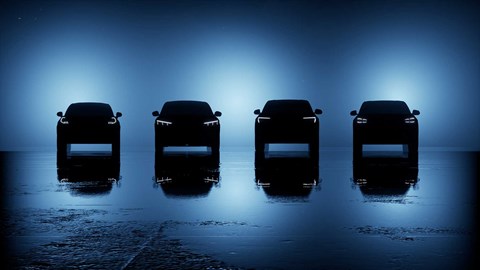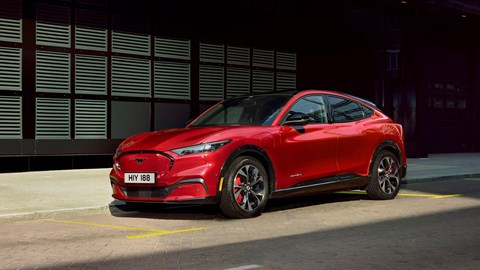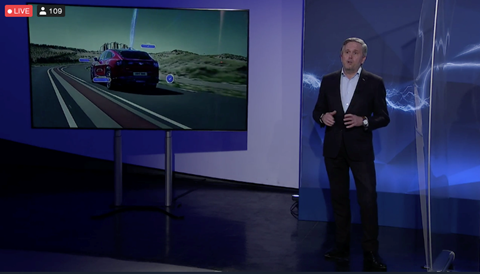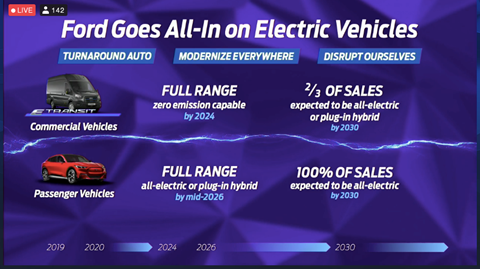► First VW-twinned electric Ford SUV teased
► One of nine all-electric Fords by 2024
► Puma EV confirmed, plus two new e-SUVs
Ford is preparing a brace of new electric crossovers developed with VW. They’re the two e-SUVs depicted far right in this teaser shot below. The two vehicles on the left are the all-electric Puma and the Mustang Mach-E. The first has just been revealed, and it’s called the Explorer.
Ford has chosen the globally popular crossover bodystyle to drive its EV expansion; buyers are lapping up this genre in every territory, making it a safer industrial bet. Ford has already confirmed a fully electric Puma will join the range alongside a pair of new crossover EVs by 2024, as it rolls out nine electric vehicles within two years. It has also pledged to go carbon-neutral by 2035.
Ford of Europe chair Stuart Rowley confirmed that the Puma EV will be built at the same Romanian factory as the combustion engine variants, which last year sold 130,000 in Europe making it Ford’s bestselling car in the region. He also revealed that the Ecosport was phased out from late 2022.

The Blue Oval has also confirmed a pair of new electric crossovers to be made in Cologne: a mid-sized crossover and a sportier SUV too – both underpinned by the Volkswagen group’s EV hardware. ‘The medium-sized crossover in 2023, then the sports crossover in 2024 will both be based on the MEB platform,’ Rowley said. He promised they would be highly differentiated products.
The Ford-VW partnership is key to the company’s electric plans. The European chief pledged that the Cologne factory – the heart of Ford’s EV plans – will account for 1.2 million units over their lifecycle.
How Ford is electrifying its whole car range by 2030
Ford had already committed to a fully electric future for its European operation, with the promise to move to an all-EV line-up in Europe by 2030. It’s a far-reaching move to electrifiction that will cost the company $22bn by 2025 – double its original EV spending plans. That’s similar to Stellantis’s €30bn ($33bn) investment to 2025; Volkswagen Group has earmarked €73bn for ‘future technologies’ out to 2025, though over a wider portfolio than Ford’s.
Ford’s European chief Rowley says its massive investment and shift of priorities is ‘an attempt to turn around manufacturing, modernise the model range and a way to disrupt ourselves.’ It needs to – as Ford of Europe finds itself behind Volkswagen Group, Stellantis and pretty much every other major player in the race to electrify its passenger car range.

Now the Blue Oval is taking action. To strengthen its European operations, the company is ploughing $1bn into its Cologne facility to create a new electric vehicle manufacturing hub – with the first EVs rolling off the line by the end of 2023. The fundamental shift to EV manufacturer has been facilitated by a ground-up restructuring of its European operations, and a return to profitability in the fourth quarter of 2020, led principally by its commercial vehicle operations (the Ford Transit has recently been the bestselling vehicle in the UK, don’t forget).
New electric cars, new vans
In addition to being all-electric by 2030, Ford says that by mid-2026 100% of its European range will be zero-emissions capable, meaning all-electric or plug-in hybrid. And to back-up the significance of this this move, the company’s entire commercial vehicle range will be zero-emissions capable, all-electric or plug-in hybrid, by 2024.
Ford is one of the biggest players in commercial vehicles and has pledged to electrify its vans:
- All-new Transit Custom 1-tonne van available as an EV in 2023
- Tourneo Custom multi-purpose vehicle available as an EV in 2023
- Smaller, next-generation Transit Courier van EV in 2024
- Tourneo Courier multi-purpose vehicle EV in 2024
Investment into the Cologne site will be used modernise its vehicle assembly facility and transform it into an electrification centre for the manufacture of electric vehicles. No new products were shown at the briefing, but it was confirmed that its first European-built, big-volume, all-electric passenger vehicle for European customers will be produced there, and Ford says it’s committed to delivering affordable EVs to all of its existing customers.

The first EV to emerge from the redeveloped Cologne facility will be a Volkswagen MEB-based mid-size crossover, with a second following shortly afterwards. Rowley (pictured) said: ‘We’ll be building volume for Europe – it is important for us to have a more targeted product line-up, and build expressive and connected new vehicles.’
Growth in its commercial vehicle business is at the heart of the company’s recent return to profitability, and it was significant that Rowley detailed CV plans before those for the passenger vehicles.
The company’s strategic alliance with Volkswagen and its Ford Otosan joint venture have helped rein in costs. Online fleet management and digital connectivity are big business, and this has led to Ford and Google pairing up to form a new collaborative group, Team Upshift. Expect to see more from this in the coming months as Ford hopes to integrate its EVs more closely into its customers’ lives.
What about UK operations?
The expansion and modernisation of Cologne comes at the expense of serious investment into the electrification of the UK operations. Rowley said: ‘The Dagenham diesel plant remains a very important part of our business, as is the Halewood transmission plant. The 2.0-litre diesel in the Transit and Ranger are the foundation of our business in the UK. Dunton is the heart of our CV operations, and it will remain an important cornerstone of our business.’
Rowley said that although the Mustang Mach-E was an end-to-end online product (you spec, order, and buy it via the web), the retail network remains a cornerstone of the business. ‘Dealers are critical to our business and Transit Centres and Ford Stores are central to the customer’s relationship with Ford. We are growing as an online business, but the dealer partners remain key to our business – as they still fulfil orders and deliver cars,’ said Rowley.
‘Our announcement today to transform our Cologne facility, the home of our operations in Germany for 90 years, is one of the most significant Ford has made in over a generation. It underlines our commitment to Europe and a modern future with electric vehicles at the heart of our strategy for growth,’ Rowley added.
Ford has pledged to ensure its entire European operation, from factories, suppliers and logistics partners will be carbon-neutral by 2035.
